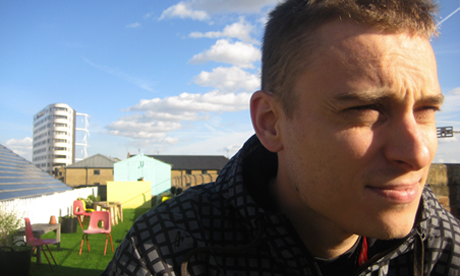Hackney activist highlights campaign to end violence against sex workers

Thierry Schaffauser at Dalston Roof Park earlier this year. Photograph: Ena Miller
Saturday 17 December is International Day to End Violence Against Sex Workers, with associated activities including a candlelight vigil in Soho this evening (Thursday 15 December) and with a film about this autumn’s Sex Worker Open University that took place at Dalston’s Arcola Theatre.
Ena Miller, who visited the ‘University’, spoke to sex worker Thierry Schaffauser about his job and his role in trying to safeguard others engaged in this line of work.
“I don’t have any disgust for the human body, so I know I can have sex with any man,” says Shaffauser. His French accent softens the intensity of what he had just said.
But this is the life Schaffauser chooses. Men pay him for sexual satisfaction, so money – not taste – largely dictates who he sleeps with. “Everyone always asks who my clients are. They can be your father, your brother. We are your family, your colleagues, people around you.”
The Sex Worker’s Open University weekend, held in October at Dalston’s Arcola Theatre, was a unique project bringing together sex workers and activists from around the world.
Many of the organisers and activists involved in the initiative call Hackney their home. They campaign and seek to address problems affecting sex workers who are too afraid to speak out. As Schaffauser maintains: “sex work is not dangerous. What makes sex work dangerous is the conditions in which we do it.”
The Sex Workers’ Open University event sought to enable sex workers to explore the diversity and contradictions of the industry on their own terms. Challenging the stereotypes of sex workers as ‘victims’ and ‘criminals’ seemed important.
The event also included closed workshops to help deal with the media, explore new skills in touch and pleasure, and navigate the complicated issues of client relationships and intimacy.
Whilst the ‘pro-sex work’ mantra was on repeat and porn directors publicised their new business ventures, there was a nod to the damaging and destructive nature of human trafficking and exploitation.
“I don’t think we pretend to speak on behalf of everyone, but what we say is not in contradiction. Of course there is violence and abuse in the sex industry and we want to fight against that, but do you think you can do that with prohibition or do you think you can do that by giving more rights to the workers?” asks Schaffauser.
No more strip clubs or sex shops are allowed to open in Hackney following a decision by the council on 26 January this year to ban such businesses from opening in the borough. The four strip clubs and one sex shop that currently exist are able to continuing trading, subject to conditions. There are no lapdancing clubs in Hackney, and under the new policy none are able to open. No existing or new massage parlours, saunas and businesses operating under such euphemisms are affected.
A low-key hello and swapping of contact details led me to the Dalston Roof Garden, where my interview with Schaffauser took place (not the best choice when it’s windy and cold – but lesson learned) so in the audio recording you’ll hear the wind periodically interrupting the flow. Our feet settled into the fake green grass soaked by the morning’s rain. A cracking view of Hackney’s skyline was our backdrop with a cute garden shed and plastic flowers setting the scene.
Schaffauser is not defined by his job as a sex worker; he is unusual in that he dares to be open about his work. It’s a part of him that supports everything else he does. He is a sex work activist as well as President of the GMB Trade Union’s Sex Workers Branch; he is also a recent masters graduate trying to decide on a thesis topic for his PhD.
Our time is up. Thierry Schaffauser has looked cold for a while, but did not complain. We clear our coffee cups and head back inside. It doesn’t feel right to start small talk and ask if he’s working tonight.
He gives a plausible list of reasons for his choice of job (and probably left several more off the list). But “education can be an expensive addiction” is the reason I remember the most.
